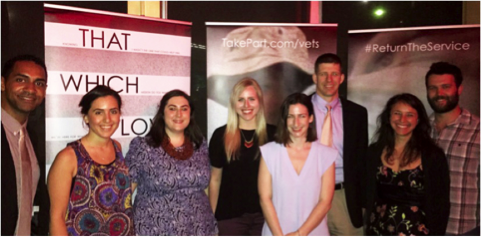About Us

The Resilience Center for Veterans & Families Co-Founders (from left to right: Joe Geraci, Dr. George Bonanno and Dr. Dinelia Rosa) with David O’Connor.
Teachers College Resilience Center for Veterans & Families pairs groundbreaking research on human emotional resilience with clinical training of therapists to assist Veterans and their families as the transition back into civilian life.
Led by Dr. George Bonanno, one of the world’s foremost authorities on human emotional resilience and recovery from trauma and loss, the TC Resilience Center studies the experiences, strengths and difficulties of veterans and their families, while researching and assessing intervention programs that can best enhance their health and well-being.
Clinical Services
Through TC's nationally regarded Dean Hope Center for Educational & Psychological Services, which offers training programs in clinical and counseling psychology, the TC Resilience Center recruits and trains its top students to counsel veterans and their families. The Dean Hope Center is led by clinical psychologist Dr.Dinelia Rosa, President of the New York State Psychological Association and an expert in training counselors and psychologists to work effectively with diverse populations.
Research
The TC Resilience Center also supports research conducted by TC doctoral students whose own military experiences have shaped their scholarly interest in resilience, post-traumatic stress disorder (PTSD) and the implications of both for the military and veteran communities.
As a global leader in health, education and psychology, Teachers College is uniquely equipped to marshal resources and expertise to develop and deliver effective, evidence-based treatments and services that meet the psychological needs of returning veterans and their families.
Veteran Initiatives At Teachers College
Teachers College is part of Columbia University, which historically and currently enrolls the largest number of veterans among Ivy League institutions. Since 2005, TC and the U.S. Military Academy at West Point have jointly operated the Eisenhower Leader Development Program (ELDP), a master’s degree program in organizational psychology for West Point officers, praised for its track record in enhancing strategic-level thinking and decision-making skills. ELDP co-founder and TC Psychology and Education Professor Warner Burke currently serves on a Blue Ribbon advisory panel charged with assessing and improving the hospital care and other health-related services provided by the Veterans Administration.
In addition, Dr. Bonanno and the Resilience Center are ideally positioned to collaborate with national organizations and agencies on expanding the Center’s impact. Within Teachers College, the Center will serve as a hub for other TC faculty who are currently working on veterans-related research, from studying the health benefits of strength training for returning soldiers, to developing new treatments for veterans who have sustained traumatic brain injuries.
Our Goals
The following goals guide the center's mission in helping veterans in their transition back to civilian life.
1. Basic and Applied Research
Development of short- and long-term research projects that focus on understanding the experiences, strengths and difficulties of soldiers and military veterans and their families, and the types of intervention programs that might best enhance their health and well-being as they transition from active duty to veteran status.
2. Development and Provision of Psychological Services
Creation and maintenance of psychological services within the TC community to provide support and education to veterans and their families;Train masters and doctoral-level student clinicians to provide these services and prepare themselves for service to this population with sensitivity to the culture and unique challenges of military and veteran life.
3. Dissemination and Collaboration
Foster avenues to disseminate information about veteran and family resilience and develop collaborative relationships with local, institutional, and federal organizations and agencies to further support and expand the impact and activities of the center.
